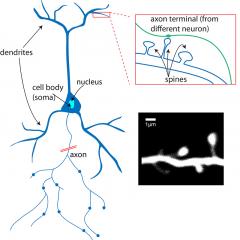What are glia?
Glia are non-neuronal cells (i.e. not nerves) of the brain and nervous system. There are a variety of subtypes of glial cells, including astrocytes, oligodendrocytes, and microglia, each of which is specialised for a particular function.
Glia do not fire action potentials, and because of this, were previously thought to be little more than housekeepers that ensured neurons could function properly. This view is now shifting, and astrocytes in particular are recognised as key components of synapses that can influence how we process information.
What’s the difference between neurons and glia?
Neurons have axons and dendrites. However, glia, unlike neurons, cannot generate action potentials (also known as spikes, or nerve impulses).

